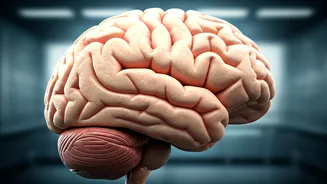Tip 1: Prioritize Sleep
Adequate sleep is fundamental for optimal brain function. During sleep, the brain consolidates memories, clears out toxins, and prepares for the next day's
cognitive demands. The article emphasizes the importance of establishing a regular sleep schedule, aiming for 7-9 hours of quality sleep each night. This includes creating a relaxing bedtime routine to signal the body it's time to rest and avoid screen time before bed, as the blue light emitted from devices can interfere with sleep. Consistent sleep habits are the foundation for improved memory and overall cognitive performance. Ensuring sufficient sleep contributes significantly to the brain's ability to function at its best, supporting everything from focus and concentration to learning and recall.
Tip 2: Mindful Diet Changes
Nutrition plays a critical role in brain health. The article recommends incorporating brain-boosting foods into the diet. This involves increasing the intake of foods rich in omega-3 fatty acids, such as fatty fish, which are essential for brain cell structure and function. It also suggests consuming plenty of fruits and vegetables that are rich in antioxidants, helping to protect brain cells from damage. The emphasis is on adopting a balanced diet that supports the brain’s needs. The information suggests reducing the intake of processed foods, sugary drinks, and excessive saturated fats, as these can negatively affect brain function and increase the risk of cognitive decline.
Tip 3: Regular Exercise Routine
Physical activity has a profound effect on brain health. Regular exercise promotes the growth of new brain cells and enhances cognitive function. The article recommends engaging in moderate-intensity exercise for at least 150 minutes per week. This can include activities such as brisk walking, jogging, cycling, or swimming. Exercise improves blood flow to the brain, which in turn delivers more oxygen and nutrients. Regular physical activity has been shown to improve memory, focus, and overall cognitive performance. The article also suggests incorporating activities that challenge the mind, such as learning new skills, or playing strategy games, to further enhance brain function.
Tip 4: Brain Training Exercises
Engaging in brain-training exercises can improve cognitive abilities. The article highlights the benefits of activities like puzzles, memory games, and learning new skills. These exercises help stimulate different areas of the brain, strengthening neural connections and improving cognitive flexibility. Playing games that require strategic thinking, such as chess or Sudoku, can improve problem-solving skills and enhance memory. Regularly challenging the brain with new and complex tasks helps keep it active and prevents cognitive decline. This approach involves regularly challenging your cognitive abilities to boost your brain’s performance over time.
Tip 5: Stress Management Techniques
Chronic stress can have a detrimental effect on brain function and memory. The article emphasizes the importance of managing stress levels to protect cognitive health. Techniques such as mindfulness meditation, deep breathing exercises, and yoga are recommended for reducing stress. Practicing these techniques regularly can help calm the mind, improve focus, and enhance overall well-being. The article also suggests incorporating relaxation techniques into daily life, such as taking breaks, spending time in nature, or engaging in hobbies that bring joy. Taking care of your mental health is crucial for optimal brain function and memory.
Tip 6: Social Interaction
Maintaining strong social connections is vital for brain health. Engaging in regular social interaction stimulates the brain and can improve cognitive function. The article suggests spending time with friends and family, participating in social activities, and joining clubs or groups. Social interaction provides opportunities for mental stimulation and helps keep the mind active. Talking to others and sharing experiences can also improve memory and cognitive abilities. Socially active individuals tend to have better cognitive function and a lower risk of cognitive decline. Social connections offer a support system, reducing stress and boosting overall brain health.
Tip 7: Hydration and Hydration
Proper hydration is essential for brain function. The brain is about 73% water, and even mild dehydration can impair cognitive performance. The article stresses the importance of drinking enough water throughout the day to support cognitive processes. Staying well-hydrated helps maintain blood flow to the brain, delivers essential nutrients, and removes waste products. Symptoms of dehydration like fatigue and difficulty concentrating can be reduced by simply drinking enough water. The article recommends drinking water regularly, and carrying a water bottle to make staying hydrated an easier part of your day.





















